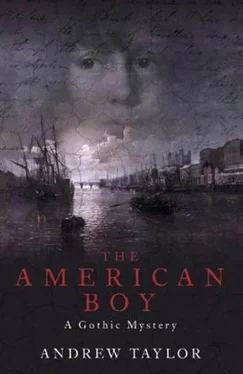Andrew Taylor - The American Boy
Здесь есть возможность читать онлайн «Andrew Taylor - The American Boy» — ознакомительный отрывок электронной книги совершенно бесплатно, а после прочтения отрывка купить полную версию. В некоторых случаях можно слушать аудио, скачать через торрент в формате fb2 и присутствует краткое содержание. Жанр: Триллер, на английском языке. Описание произведения, (предисловие) а так же отзывы посетителей доступны на портале библиотеки ЛибКат.
- Название:The American Boy
- Автор:
- Жанр:
- Год:неизвестен
- ISBN:нет данных
- Рейтинг книги:4 / 5. Голосов: 1
-
Избранное:Добавить в избранное
- Отзывы:
-
Ваша оценка:
The American Boy: краткое содержание, описание и аннотация
Предлагаем к чтению аннотацию, описание, краткое содержание или предисловие (зависит от того, что написал сам автор книги «The American Boy»). Если вы не нашли необходимую информацию о книге — напишите в комментариях, мы постараемся отыскать её.
The Richard and Judy Best Read of the Year (nominee)
***
'An enticing work of fiction… Taylor takes account of both a Georgian formality and a pre-Victorian laxity in social and sexual matters; he is adept at historical recreation, and allows a heady decor to work in his favour by having his mysteries come wrapped around by a creepy London fog or embedded picturesquely in a Gloucestershire snowdrift' -Patricia Craig, TLS
'Without question, the best book of 2003, and possibly the best book of the decade, is Andrew Taylor's historical masterpiece, The American Boy. A truly captivating novel, rich with the sounds, smells, and cadences of nineteenth-century England' -Manda Scott, Glasgow Herald
'Long, sumptuous, near-edible account of Regency rogues – wicked bankers, City swindlers, crooked pedagogues and ladies on the make – all joined in the pursuit of the rich, full, sometimes shady life. A plot stuffed with incident and character, with period details impeccably rendered' -Literary Review
'Taylor spins a magnificent tangential web… The book is full of sharply etched details evoking Dickensian London and is also a love story, shot through with the pain of a penniless and despised lover. This novel has the literary values which should take it to the top of the lists' -Scotland on Sunday
'It is as if Taylor has used the great master of the bizarre as both starting-and finishing-point, but in between created a period piece with its own unique voice. The result should satisfy those drawn to the fictions of the nineteenth century, or Poe, or indeed to crime writing at its most creative'-Spectator
'Andrew Taylor has flawlessly created the atmosphere of late-Regency London in The American Boy, with a cast of sharply observed characters in this dark tale of murder and embezzlement' -Susanna Yager, Sunday Telegraph
'Madness, murder, misapplied money and macabre marriages are interspersed with coffins, corpses and cancelled codicils… an enjoyable and well-constructed puzzle' -Tom Deveson, Sunday Times
***
Interweaving real and fictional elements, The American Boy is a major new literary historical crime novel in the tradition of An Instance of the Fingerpost and Possession. Edgar Allan Poe is the American boy, a child standing on the edge of mysteries. In 1819 two Americans arrive in London, and soon afterwards a bank collapses. A man is found dead and horribly mutilated on a building site. A heiress flirts with her inferiors. A poor schoolmaster struggles to understand what is happening before it destroys him and those he loves. But the truth, like the youthful Poe himself, has its origins in the new world as well as the old. The American Boy is a 21st-century novel with a 19th-century voice. It is both a multi-layered literary murder mystery and a love story, its setting ranging from the coal-scented urban jungle of late Regency London to the stark winter landscapes of rural Gloucestershire. And at its centre is the boy who does not really belong anywhere, an actor who never learns the significance of his part.












